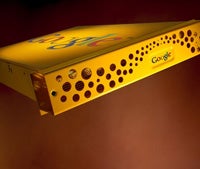 |
Source: Google |
Google announced a major upgrade to its Search Appliance hardware and many more features to the related software that current owners of the system can get for free.
The current Search Appliance (Model GB-1001) can search up to 3 million documents. Google said the latest version (Model GB-7007), available next month, can handle up to ten million documents.
“This compares to having to manage a dozen or more servers in the more traditional approach to enterprise search,” Ninton Mahntani, Google’s lead product manager for enterprise search, told InternetNews.com. “We have brand new hardware and software to search 10 million documents in a single box.”
Google’s move to improve its search hardware comes at a time when content management is a growing concern in the enterprise. According to Gartner research, quoted by Google, enterprise content is growing at the rate of 80 percent year. The number of separate content repositories is also on the grow with Gartner reporting some 66 percent of enterprises have six or more separate content repositories.
“The reality is the end user suffers because it means having to log into separate repositories for information on sales or engineering, for example,” Mahntani said.
Gartner analyst Whit Andrews said the new Appliance is further proof Google is making a serious, concerted effort to capture more of the enterprise search market. “Over the last few quarters, Google has sold more licenses than anyone else” in the enterprise search space, Andrews told InternetNews.com. “They are an extremely powerful player in enterprise search,” he added. “That’s not to say they’re making the most money; we put them in third place in terms of revenue, but they’re very successful in volume sales, with an easy-to-use product and a fabulous brand.”
Andrews notes enterprise search companies, such as Autonomy, offer more comprehensive search offerings that cover multiple data tapes. “They make more money than Google by a substantial margin — hundreds of millions of dollars. Google’s not at that level today, but they’re putting these vendors [Autonomy, Microsoft’s FAST, Endeca and others] on notice that they have every intention of climbing functionality and scale.”
On the software side, Google has added some features familiar to users of its popular consumer services. Search Appliance users can now, for example, set “Google Alerts” on specific terms and receive an email notification when a new document with that term is added to the system, say a customer name or new product in development. You can also set the frequency for receiving alerts (weekly, hourly or daily) and also be alerted when existing documents related to an alert are modified.
More personalized search
Other software improvements include a more personalized search so, for example, a user in sales might get different results, or at least results prioritized differently, than someone in engineering for the same query. Another new feature is “metadata biasing.” Here the idea is that IT can give certain documents more “weight” so, for example, documents that include the name of the head of human resources might be more likely to show up in an employee search for “benefits.”
On the security side, Google has added support for Kerberos
“The benefit to the end users is they can log into a desktop or notebook computer once and they won’t be asked for a password again,” Mahntani said.
Google also touted customer growth for its enterprise services. Late last year Google said it has 10,000 Search Appliance customers; now its referencing over 20,000 enterprise search customers, a figure that includes both Appliance and Google Site Search customers. Rather than an onsite appliance, Site Search is hosted by Google.
Sunnybrook Health Sciences Centre in Canada, said it’s been using Google’s Search Appliance and SharePoint Connector to search a hundred SharePoint repositories, intranet content, multimedia library, and employee information in Microsoft Exchange.
Pricing for the new Appliance is based on the number of documents to be searched. Mahntani said the original entry level box is still available starting at $30,000 for searching up to half a million documents and includes two years of support. He said there is “linear discounting” from there based on how many more documents a customer might want to add up to 10 million.
Updated to add analyst comments


